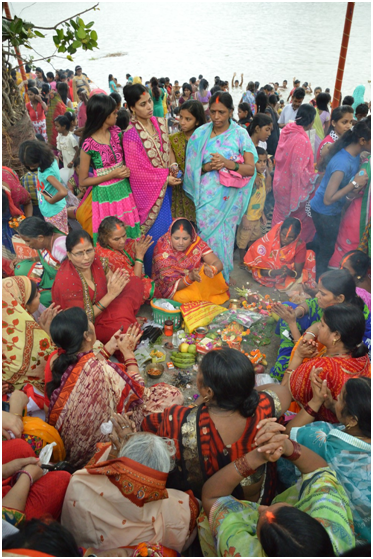
Jivitputrika Festival
Jivitputrika Festival
- At least 46 people, including 37 children, drowned while taking holy dip in rivers and ponds in several Bihar districts during the ‘Jivitputrika’ festival, recently.

About Jivitputrika Festival:
- Jivitputrika, or Jitiya Vrat, is a Hindu festival observed primarily in the northern and eastern parts of India, including Bihar, Uttar Pradesh, Jharkhand, and Nepal.
- It is celebrated by mothers who fast for the well-being, long life, and prosperity of their children.
- The festival spans three days, with the main ritual involving a strict ‘nirjala’ fast, meaning no water is consumed during the fast.
- The fast is considered an expression of a mother’s devotion and love, with the belief that it will bring divine blessings upon her children.
- The festival is rooted in Hindu mythology, particularly the story of King Jimutavahana, whose sacrifice for the welfare of others is commemorated during this time.
- The celebration begins with Nahai-Khai, where mothers take a purifying bath and eat a nourishing meal.
- The second day is marked by the rigorous fasting ritual, and the festival concludes on the third day with Paaran, where the fast is broken with a meal.
जीवितपुत्रिका महोत्सव
- हाल ही में जीवित्पुत्रिका त्योहार के दौरान बिहार के कई जिलों में नदियों और तालाबों में पवित्र स्नान करते समय 37 बच्चों सहित कम से कम 46 लोग डूब गए।
जीवित्पुत्रिका उत्सव के बारे में:
- जीवित्पुत्रिका या जितिया व्रत, एक हिंदू त्योहार है जो मुख्य रूप से बिहार, उत्तर प्रदेश, झारखंड और नेपाल सहित भारत के उत्तरी और पूर्वी हिस्सों में मनाया जाता है।
- यह उन माताओं द्वारा मनाया जाता है जो अपने बच्चों की भलाई, लंबी आयु और समृद्धि के लिए उपवास रखती हैं।
- यह त्योहार तीन दिनों तक चलता है, जिसमें मुख्य अनुष्ठान सख्त ‘निर्जला’ उपवास होता है, जिसका अर्थ है कि उपवास के दौरान पानी नहीं पिया जाता है।
- यह व्रत एक माँ की भक्ति और प्रेम की अभिव्यक्ति माना जाता है, इस विश्वास के साथ कि यह उसके बच्चों पर दिव्य आशीर्वाद लाएगा।
- यह त्योहार हिंदू पौराणिक कथाओं, विशेष रूप से राजा जीमूतवाहन की कहानी पर आधारित है, जिनके दूसरों के कल्याण के लिए बलिदान को इस दौरान याद किया जाता है।
- यह उत्सव नहाय-खाय से शुरू होता है, जहाँ माताएँ शुद्ध स्नान करती हैं और पौष्टिक भोजन करती हैं।
- दूसरे दिन कठोर उपवास अनुष्ठान होता है, और त्योहार तीसरे दिन पारण के साथ समाप्त होता है, जहाँ भोजन के साथ उपवास तोड़ा जाता है।